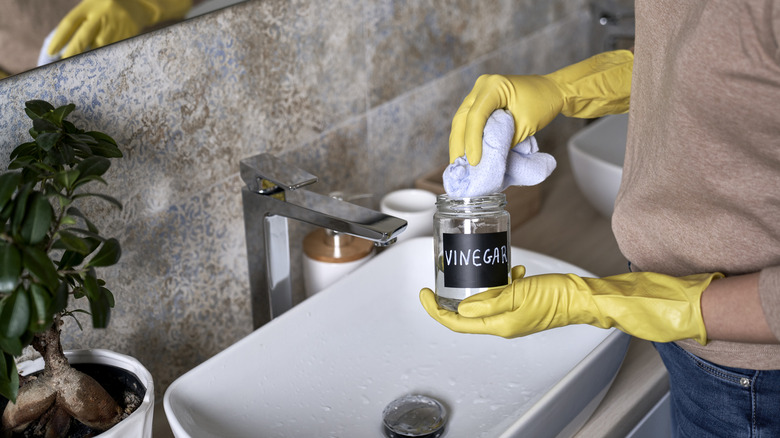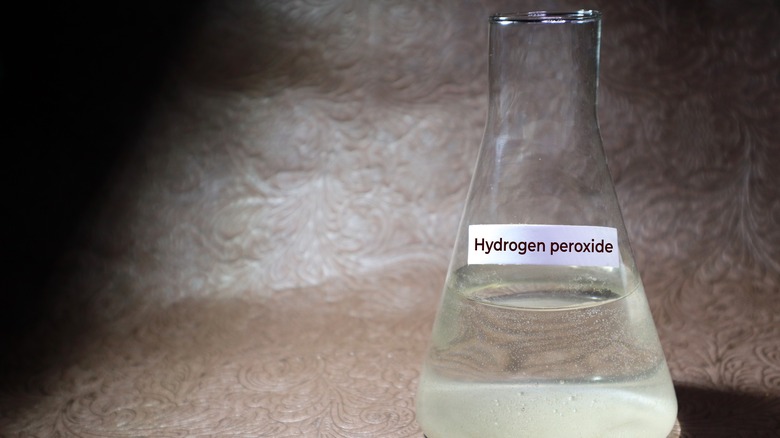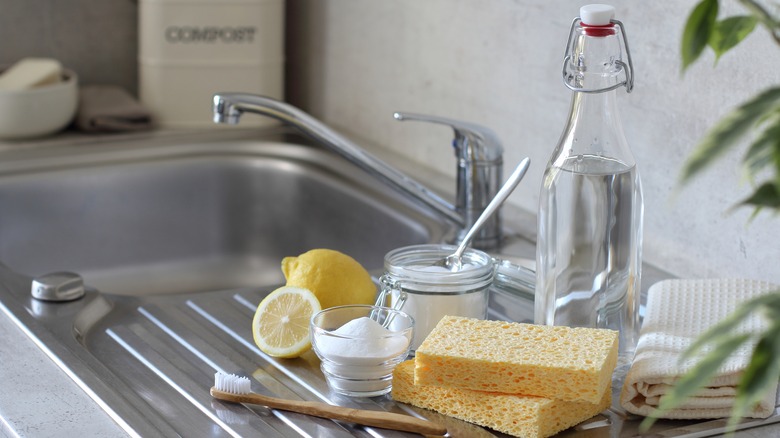Mixing Hydrogen Peroxide And Vinegar While Cleaning Is A Big Mistake. Here's Why
Hydrogen peroxide and vinegar stand as pillars in the world of household cleaning, each boasting unique properties that make them staples in many homes. Hydrogen peroxide, a chemical compound with the formula H2O2, is renowned for its disinfecting and bleaching abilities. It's a common choice for disinfecting surfaces, as it effectively breaks down organic compounds and annihilates bacteria through oxidation. Vinegar, on the other hand, is primarily acetic acid and water. Its acidic nature enables it to dissolve mineral deposits, cut through grease, and eliminate a wide range of bacteria and viruses.
The inclination to mix these two agents stems from a well-intentioned but misguided belief that their combined effects might produce a superior cleaning agent. However, when you mix hydrogen peroxide and vinegar, they react to form peracetic acid. This chemical reaction is spontaneous and occurs without other external catalysts. Peracetic acid is a powerful oxidizer, and its presence in the home can be problematic. Exposure to peracetic acid can lead to irritation of the skin, eyes, and respiratory system, especially in poorly ventilated areas common in household settings. Furthermore, there's no guarantee the acid can safely clean all surfaces.
Efficacy of peracetic acid in household cleaning
Contrary to what some might think, mixing hydrogen peroxide with vinegar doesn't actually boost their cleaning power in your home. While peracetic acid is indeed a potent cleaner and disinfectant, it is weaker than acetic acid. In industrial settings, where it's used in higher concentrations, it's quite effective. However, in the DIY mixture you whip up in your kitchen, it may not really outperform the cleaning abilities of hydrogen peroxide and vinegar when they're used separately.
But here's the kicker: the safety concerns with peracetic acid are significant, especially because you can't precisely control its concentration in a homemade mix. In a commercial product, peracetic acid comes with specific usage instructions to ensure safety and effectiveness. But when you're mixing it at home, there's no way to know if you're hitting the right concentration. If it's too strong, it could be dangerous, and if it's too weak, it's not doing much at all.
Also, think about your surfaces at home — your metals, plastics, and fabrics. Have you experimented on these surfaces before? Peracetic acid may potentially cause damage. So, while it might sound like a powerful cleaning hack, mixing hydrogen peroxide with vinegar could end up doing more harm than good, both to you and your household surfaces.
Safe combinations with hydrogen peroxide and vinegar
Mixing hydrogen peroxide with the wrong substances can be a gamble, but there are safe bets, too. For instance, hydrogen peroxide and baking soda make quite a team. This mixture is particularly effective for tasks like removing stains from grout or whitening surfaces. The mild abrasiveness of baking soda works well with the oxidizing properties of hydrogen peroxide, making it a potent cleaning paste. Another smart mix is hydrogen peroxide with dish soap. This duo is your go-to for tackling organic stains like food spills or the occasional wine mishap on your carpet or upholstery. Just a gentle dab, and you'll see the difference.
When it comes to cleaning with vinegar, the combination with baking soda is almost legendary. You've probably heard of this or even seen it in action. It's the classic science fair volcano, right? But in your home, this combination is a cleaning powerhouse. When vinegar (an acid) meets baking soda (a base), they fizz and bubble. This reaction is not just fun to watch; it's effective in dislodging grime and unclogging drains. It's particularly great for those tough cleaning jobs where you need a bit more oomph. Another simple yet effective partner for both vinegar and hydrogen peroxide is plain old water. This mix is particularly useful when you're looking for a milder solution. By diluting them with water, you get a gentler cleaner that's perfect for more delicate surfaces or for when you just need a light cleaning.



